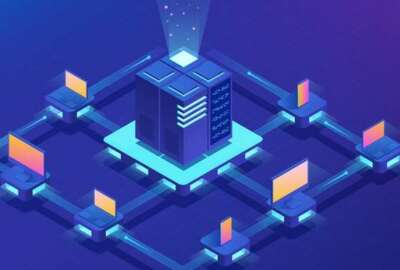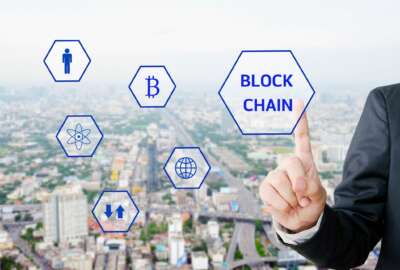Hubbard Radio Washington DC, LLC. All rights reserved. This website is not intended for users located within the European Economic Area.
Why government spending on blockchain is small but on the rise
Agency spending on blockchain is a tiny fraction of total technology spending. But it's important and growing, according to analysis by Deltek, a company focuse...
Agency spending on blockchain is a tiny fraction of total technology spending. But it’s important and growing, according to analysis by Deltek, a company focused on delivering software and information solutions. For more on what Deltek is spending and why, Federal Drive with Tom Temin spoke with Alex Rossino, Deltek Advisory Research Analyst.
Interview Transcript:
Tom Temin And just set the basic stage for us. Blockchain, which a few years ago was touted as the next thing since the jet engine or something is just a very tiny little amount of money. Give us the numbers first and then we’ll talk about the uses and the use cases.
Alex Rossino Yeah, sure. Federal spending on blockchain technology is in the last three years has pretty much doubled. So whereas it was just over $5 million in 2020, it’s now close to 12. So I know, as you mentioned, that’s a drop in the bucket compared to the billions and hundreds of billions that are spent by the federal government on technology. But it indicates that there’s work going on and that there’s interest as well.
Tom Temin And let me just ask this off the wall question. Could it be that blockchain is offered as one of the long lists of services by cloud services providers and therefore usage of blockchain through something that the cloud offers is just buried in cloud spending but may not show up as blockchain?
Alex Rossino Yes, so that’s an excellent question. I have definitely seen that trend when it comes to advanced analytics and when it comes to cybersecurity spending. So those kinds of capabilities, blockchain spending is not quite as clear. There is some, but it’s difficult to parse out exactly what might be delivered, say, as a software, as a service versus an on premise use by our individual instances, by agencies. So my inclination right now would be to say that it’s probably more just one off uses by agencies for research and development and exploration. But I think that the cloud is probably a very viable avenue in the future.
Tom Temin Sure. But in the meantime, you can buy blockchain as a type of software, just like you buy a database or a development tool.
Alex Rossino Right? You can do that. And this is one of the interesting things about the analysis that I did of the data I was able to find on FPDS, and that is that I’m not sure exactly which blockchains they are experimenting with. So if you go on any cryptocurrency trading site or anything, there are thousands of them, right? And they all have all different use cases. So they’re called crypto currencies, but they actually are software. So and they have different uses. Many of them are for logistics, some of them are for supply chain tracking, cybersecurity, things like that. So determining which ones they’re actually experimenting with is something that I haven’t been able to suss out yet.
Tom Temin And you make the distinction between the blockchain itself, and there’s a lot of spending on blockchain analytics for forensic purposes or whatever. But let’s talk about who’s buying it. The Air Force, by your analysis, is the largest, but everything else is civilian. So when you add up, all the civilian way outweighs what DoD is spending.
Alex Rossino Yeah, that’s true. Air Force is really looking at it for logistics purposes and for predictive maintenance. So they’re kind of looking at tracking the different kinds of maintenance that have been done in different air platforms and then tying it to analytics. But when it comes to the civilian agencies, you see that the FBI and the SEC and Treasury, which is really IRS, are using blockchain data analytics in order to try and track down transactions. So I mentioned before that there are many types of different blockchain software and many of them are called cryptocurrencies. In this case, we’re dealing with cryptocurrency transactions versus blockchains that are being used for other software purposes.
Tom Temin We’re speaking with Alex Rossino. He’s advisory research analyst at Deltek. And that’s an important distinction. Using it for research or for trying things and engineering types of stuff, but it’s not widely in production as a ledger to store data that it’s recalled, except maybe for the Air Force.
Alex Rossino That’s true. That’s true. There are some other places that they’re looking at it, too, like at the Defense Threat Reduction Agency. They’re examining blockchains as a potential a solution to the quantum encryption problem. So you’ve probably heard about quantum computing being a threat to current encryption methods. And so they’re really experimenting with how to use blockchain or integrate it as a way to harden encryption. So that’s kind of fascinating, too.
Tom Temin Yeah, of course. What do they say? The Chinese have stolen all the data they want. They’re just waiting till they can encrypt it when the quantum comes around. Close the barn door after the cow got out. But let’s talk about the analytics side, because I think in forensics and crime analysis, understanding what’s going on with blockchains, which is discernible with analytic tools, not your own blockchains, but the ones that are out there are something agencies are getting into.
Alex Rossino Right. So one of the sort of great misconceptions about cryptocurrency in general is that it’s anonymous. There are some that are designed to be anonymous, but it’s really better to look at it as pseudonymous. I actually can’t believe I actually pronounce that word correctly. Thank you. So anyone who uses cryptocurrency, you have a wallet or what’s called a wallet and it has an address. And that address is immutable for that blockchain. So if you have a Bitcoin address, then that’s always going to be your Bitcoin address until you create a new wallet. So any transactions linked to that address can be easily tracked and traced using advanced analytics. It’s just a matter of agencies that are seeking to identify illicit sort of transactions. So whether it’s, I don’t know, cartel activity or oligarch activity in Eastern Europe or something like that, they want to try and identify which blockchain wallets or which Bitcoin wallets are linked to that individual or that entity. And so that’s what the analytics are for in order to try and unpack that.
Tom Temin Yes, because they are simply long hashes, right? The addresses and the transactions. And it’s actually possible to trace that to an individual or to an IP address.
Alex Rossino It is if you have confirmed the identity of the entity or the individual linked it to the address. So once that’s done, you can track any activity on that wallet.
Tom Temin And this is what agencies are trying to do then?
Alex Rossino It looks like it, yeah. The ones that we’re looking at are in law enforcement or can start talking about are either law enforcement or tax enforcement or trading enforcement. So the Securities and Exchange Commission. So they’re the only reason I can think of that they’d be using blockchain analytics is really to unpack these transactions and understand where money, quote unquote, is going.
Tom Temin And I also wanted to ask you about the inclusion of blockchain requirement in some of the big government wide acquisition contracts coming out. If they ever do come out, how does that get baked in and what are they asking for the agencies?
Alex Rossino So they’re asking for expertise in engineering and working with these kinds of technologies. It’s still very new thing, especially in the federal government. It’s not like cloud computing where everyone has cloud instances now and everyone knows how to use SAS, but when it comes to blockchain, it’s still being really understood and developed, especially the use cases. So when you have large vehicles like Polaris that actually were listed as a requirement to have expertise in it, it bodes well for investment for the future, but it also creates a little bit of a problem for the vendors who will be bidding on these contracts, because finding people who actually have this kind of expertise is very difficult. It’s very niche right now. And also the private sector pays incredible salaries for that expertise. So government and its contractors will be competing like they are with cybersecurity talent will be competing for people who have that kind of expertise as well.
Tom Temin That’s interesting because having that expertise as a requirement doesn’t mean it’s going to get sold. It’s almost like telling people to have anchovies in the cupboard, even though nobody’s going to be wanting anchovies. But it’s a cost there for the companies to maintain this knowledge that may or may not be something on a task order.
Alex Rossino That’s true, and it may never appear. And if it does appear, then you have to scramble.
Tom Temin And a final question. I mean, blockchain has been around for decades in banking and finance as their ledger. Why now? What’s different now than was different 20 years ago?
Alex Rossino So I think it’s really a couple of things. One is simply the attention that’s being drawn to it. Bitcoin is now approaching $31,000 and that’s the blockchain that really got everyone’s attention when it came out in 2009. But the other thing is simply the efficiency of the technology. Something like Bitcoin is extremely inefficient because it’s very slow, the transactions are very large for the most part, and there have been attempts to mitigate that through different kinds of things, like adding protocol, like lightning protocol, etc. and they’ve had some success there. But there are others that have been developed like Stellar or XLM/ which has been developed by IBM, which are extremely fast and they are extremely useful. So you can use them and apply them to different sorts of cases. Cybersecurity, identity verification, again, like I said, tracking logistics, supply chain. So the uses are growing and the attention is growing because of the viability of the technology. So I think it kind of goes hand in hand like chicken and the egg, but they kind of work in a circular pattern now.
Copyright © 2024 Federal News Network. All rights reserved. This website is not intended for users located within the European Economic Area.
Tom Temin
Tom Temin is host of the Federal Drive and has been providing insight on federal technology and management issues for more than 30 years.
Follow @tteminWFED





